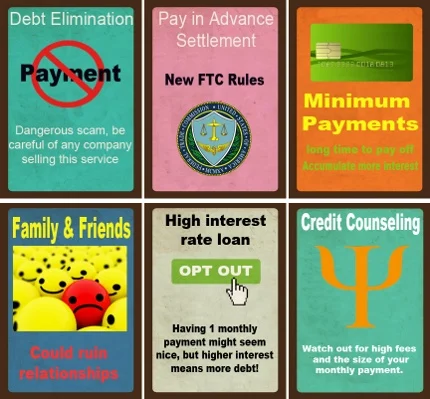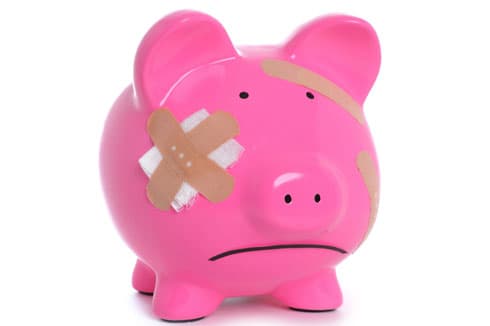How to Avoid Debt Relief Scams
Learn Which Six Debt Relief Tactics & Scams to Avoid
Not all debt relief solutions help consumers over the long run. When you deal with excessive debt, you may want to jump at the first solution that comes your way. But some of these solutions are scams, and others are not in your best long-term interest. Here are seven debt relief solutions to avoid when seeking debt relief. Later, we share seven questions you should ask potential debt relief partners, which will help you avoid a scammer.
1. So-Called ‘Debt Elimination’
Like other scams, Debt Elimination is based on a lie. The same type of people who claim consumers can avoid paying the IRS have surfaced telling people the credit card debt they carry need not be repaid and can be eliminated. The crackpots base their claim on the notion that debts are non-collectible because only the government may create money and that the credit card issuers created money when they granted you a credit line. They want you to believe that when you buy a big-screen TV using your credit card you did not incur a debt, but the debt exists between the credit card issuer ad the TV retailer. Debt Elimination is based on an incomplete or severely twisted understanding of law, and has the same basis in reality as believing in Santa Claus and the Easter Bunny.
2. Pay-In-Advance Debt Settlement
As of October 2010, FTC rules prohibit debt settlement firms collecting fees from a customer until his or her first account is settled. This makes settlement an even more attractive option for the consumer. However, the rules apply to debt settlement firms that use telecommunications to solicit for customers, which virtually all do. Therefore, some debt settlement firms are trying to skirt the rules by offering to meet with potential clients in person. For debt settlement firms situated in densely populated areas, this may be viable economically, but it is unlikely. The best rule of thumb is to make sure that any debt settlement firm you consider hiring is compliant with the FTC rules. Those claiming to be exempt from the rules are probably not truthful, which is not what you want in a debt settlement provider.
3. Paying Credit Card Minimum Monthly Payments
Paying the minimum on your credit card bill seems like a smart move for getting some debt relief. After all, it means you are actively paying off your debt, and you pay the amount the credit card company requires of you. It also may leave you with extra cash for other things. However, the minimum payments on credit card bills are usually not high enough to pay down your debt in a timely manner. And the longer a balance remains on your card, the longer you are charged interest on that balance, increasing the overall total debt you have to pay. Make an effort to pay more than the minimum, as much as is possible for you, so you can eat into the overall total, accumulate less interest, and pay off your debt faster.

4. Seeking Debt Relief from Friends or Family
When you face an overwhelming amount of debt, and you have friends or family members that can afford to help you pay for some or all of it, taking a loan from them may sound like a great idea. There is no interest rate to worry about, unless you agree to set one, and, in theory, you can pay it off at your own pace without having to worry about due dates or defaulting on the loan. But using a friend or a family member as your debt relief solution can lead to strained relationships. Without a legal agreement, you will not feel the same amount of pressure to pay it back, and the other person will certainly become upset if you fail to repay your debt.
5. Paying Off Debt with a High-Interest Loan
You just found a loan with a credit limit that covers all of your current debt, so it seems look good financial sense to take out that loan, pay off all of your debt, and have only one payment to take care of. While this is a debt relief solution that can work, you always need to look at the fine print of the loan terms. Make sure you know what the interest rate is and compare it to all of your current credit cards and loans. If it's a higher interest rate, then you just found a solution that will give you more debt.
6. Credit Counselors with High Fees
Credit counselors can help you manage your debt, so you do not want to necessarily rule them out entirely. But you do want to be careful about which counselors you approach. If a credit counselor offers to help you at a high fee and asks you to pay upfront, be very wary of that counselor. Some credit counselors prey on people who are vulnerable because of their debt situation, and they will take your money without actually helping you. Do your homework before hiring a counselor to deal with your debt.
7. Bankruptcy as a Debt Solution
No, bankruptcy is not a scam. In fact, it is a viable debt relief solution that is written into the US Constitution. However, we include it in this list because it should be your last resort. First, to file for chapter 7 bankruptcy, you first must qualify. In the bankruptcy codes, this qualification process is called a means test. If you qualify, then your debts will be discharged. However, you may also need to surrender or sell valuables you own if they are not covered by your state's bankruptcy exemptions. A chapter 13 bankruptcy is a court-supervised 5-year payment plan, which is not a bad thing in itself. The downsides to chapter 7 and 13 include:
- Bankruptcy is a public record
- Bankruptcy rules set strict limits on the time that must pass between bankruptcy filings.
- Once filed, a bankruptcy trustee controls your assets
- Bankruptcy has a significant negative impact on a consumer's credit score
A solution to your debt problems exists. Start by understanding your debt, educating yourself about the best ways to reduce it, and understanding which tactics to avoid.
7 Ways to Find a Strong Debt Relief Partner
Here are seven basic questions anyone considering a debt relief company should ask a provider before signing an agreement:
- How many customers solved their debt problems successfully through the program? Understanding a company’s history — how long they’ve been in business, how many customers they have served, and how successfully — goes a long way towards understanding their approach and stability. These statistics should be made available upon request.
- Does the company provide a free debt consultation and financial evaluation? A reputable debt relief company will first provide potential customers with free debt-related educational material and a free personalized consultation to understand their financial situation and debt relief alternatives. If you do not receive these offers or are immediately recommended to subscribe to a debt management plan or settlement plan, be wary.
- What types of debt relief services are included? It is a red flag if a provider offers only one type of debt relief solution. You should find a company that offers multiple programs so you can be matched with the one that best fits your individual needs.
- Are there any up-front fees required? Ask for explicit instructions on how to engage with the provider so there are no fees disguised as subscriptions or similar smoke and mirror type of charges. New regulations prohibit debt relief providers from charging any fees before a debt is successfully reduced or until new payment terms are set up and initiated. It is also important to understand how companies structure their fees. Minimal monthly fees sound reasonable, but when an average program can run 36 to 60 months these fees can add up quickly.
- How is the provider compensated? Find out whether the company receives any type of compensation from the creditors themselves. This is a frequently the case with credit counseling companies, where they earn what is called "fair-share" and can lead to a conflict of interest. Ideally, a firm should be compensated based on the amount of your debt they help resolve so that their interests are aligned with your own.
- Will the same team that assesses my financial situation manage my account through to resolution? Be careful of companies that transfer your account to outside contractors or third party providers as they will have a limited understanding of your situation and specific needs. The debt relief industry is populated with simple sales organizations that broker consumers to other actual providers of the debt relief service for a hefty fee. Try to work with a company that can handle your case from the beginning through to the elimination of debt.
- What happens if my creditors sue me? Ask whether the provider will assist you in dealing with creditor calls or debt collectors. Many debt relief companies will simply drop a client in this situation, so be explicit in your questions and find a company that will work with you throughout the process regardless of creditor pressure.
For more information on each type of service, please review the Bills.com Debt Relief Guide.
Free up cash each month with Freedom Debt Relief

Ozzy S., Freedom client
“Right away, I had more money each month because of program costs so much less than what I was paying on my minimums.”
Actual client of Freedom Debt Relief. Client’s endorsement is a paid testimonial. Individual results are not typical and will vary.

